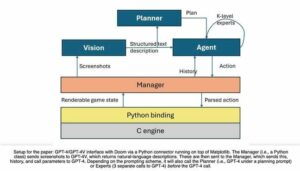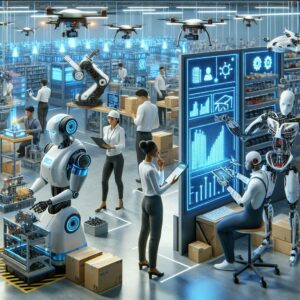
Nearly half of US office workers expressed concern that AI might take their jobs in a February survey by investment banking biz Jefferies.
Bankers aside, managers may want to worry, too.
Researchers at ESMT Berlin argue that AI can help manage research projects, allowing them to operate at greater scale and efficiency than human stewardship.
Maximilian Koehler, PhD candidate at ESMT, and Henry Sauermann, professor of strategy at ESMT, make the case for software-as-a-supervisor in a paper titled “Algorithmic management in scientific research.”
The paper appears in the academic journal Research Policy (Volume 53, Issue 4, May 2024), but is also available via SSRN without the paywall.
AI-based tools, the authors say, can augment human work by accelerating reviews of scientific literature, identifying research questions, assisting in data processing, and predicting innovative drug compounds. But these can’t replace experts, at least not yet.
“Despite these advances in capabilities of AI as a ‘worker,’ however, human scientists will remain important in the foreseeable future, and the scale and complexity of research projects will continue to grow,” they state in their paper. “As such, we complement the focus on AI as a worker to explore AI as a ‘manager’ of humans who perform research tasks.”
The authors cite a growing number of use cases where algorithmic management has the potential to improve productivity.
“The capabilities of artificial intelligence have reached a point where AI can now significantly enhance the scope and efficiency of scientific research by managing complex, large-scale projects,” said Koehler in a statement.
To assess the viability of algorithmic management, the authors looked at some 200 hundred research projects to see how they handled five managerial challenges – task division and task allocation, direction, coordination, motivation, and supporting learning.
After various interviews and inquiries, they identified 16 projects and two platforms that relied on automated management to some extent.
These include: Aurorasaurus, Crea.visions, eBird, EteRNA, and Galaxy Zoo, among others.
For example, in Galaxy Zoo, a crowdsourced galaxy classification project, the AI is designed to improve participant engagement, not unlike the gamification systems used to keep Uber drivers and other gig workers on the job.
“AI predicts the probability of participant disengagement and provides interventions (i.e., messages) to increase user motivation,” the paper explains. “The AI balances the trade-off between messages sent too early (disrupting the workflow and addressing a problem that was not acute yet) versus messages sent too late.”
While this bit of algorithmic management did not make users spend more time with Galaxy Zoo, “it increased classification speed without lowering data quality.”
Based on a comparison with projects that don’t rely on managerial AI, the authors claim that those using mecha-management tend to be larger and tend to be associated with platforms, due to the benefit of shared technology infrastructure. This, they say, has implications in terms of platform dominance and how large research organizations like universities should approach research funding and IT infrastructure.
The researchers say further investigation into the impact of algorithmic management needs to be done, noting that scientific work differs from gig work and office work, where studies on the impact of algorithmic intervention have already been undertaken.
“On the one hand, autonomy has traditionally been a core feature of science and an aspect that researchers value highly,” the authors say. “On the other hand, algorithmic management may reduce autonomy if AI monitors researchers individually and continuously.”
The boffins say, such systems raise ethical and legal questions about exploitation from motivational mechanisms and worker control over data about their skills, motivation, and performance – eg, what if organizations shared worker metrics data from AI management systems and that influenced future hiring decisions involving said workers.
Yet even if AI is allowed some degree of discretion in directing scientists, it’s not the end of three-Martini lunches, expense-account golf, inflated contracts, self-dealing, and issuing arbitrary mandates to subordinates.
“If AI can take over some of the more algorithmic and mundane functions of management, human leaders could shift their attention to more strategic and social tasks such as identifying high-value research targets, raising funding, or building an effective organizational culture,” said Sauermann.
Or even dismantling organizational culture through layoffs. ®
- SEO Powered Content & PR Distribution. Get Amplified Today.
- PlatoData.Network Vertical Generative Ai. Empower Yourself. Access Here.
- PlatoAiStream. Web3 Intelligence. Knowledge Amplified. Access Here.
- PlatoESG. Carbon, CleanTech, Energy, Environment, Solar, Waste Management. Access Here.
- PlatoHealth. Biotech and Clinical Trials Intelligence. Access Here.
- Source: https://go.theregister.com/feed/www.theregister.com/2024/04/05/ai_management_jobs/
- :has
- :is
- :not
- :where
- 16
- 200
- 2024
- 7
- a
- About
- academic
- accelerating
- addressing
- advances
- AI
- algorithmic
- allocation
- allowed
- Allowing
- already
- also
- among
- an
- and
- appears
- approach
- arbitrary
- argue
- artificial
- artificial intelligence
- AS
- aspect
- assess
- assisting
- associated
- At
- attention
- augment
- authors
- Automated
- autonomy
- available
- balances
- Banking
- BE
- been
- benefit
- Berlin
- between
- Bit
- biz
- Building
- but
- by
- CAN
- candidate
- capabilities
- case
- cases
- challenges
- claim
- classification
- CO
- coming
- comparison
- Complement
- complex
- complexity
- Concern
- continue
- continuously
- contracts
- control
- coordination
- Core
- could
- Culture
- data
- data processing
- decisions
- Degree
- designed
- Despite
- DID
- directing
- direction
- discretion
- Division
- Dominance
- don
- done
- drivers
- drug
- due
- e
- Early
- Effective
- efficiency
- end
- engagement
- enhance
- ethical
- Even
- example
- experts
- Explains
- exploitation
- explore
- expressed
- extent
- Feature
- February
- five
- Focus
- For
- foreseeable
- from
- functions
- funding
- further
- future
- Galaxy
- gamification
- golf
- greater
- Grow
- Growing
- Half
- hand
- Have
- help
- henry
- highly
- Hiring
- How
- However
- HTTPS
- human
- Humans
- hundred
- i
- identified
- identifying
- if
- Impact
- implications
- important
- improve
- in
- include
- Increase
- increased
- Individually
- influenced
- Infrastructure
- innovative
- Inquiries
- Intelligence
- intervention
- interventions
- Interviews
- into
- investigation
- investment
- investment banking
- involving
- issue
- issuing
- IT
- Job
- Jobs
- journal
- jpg
- Keep
- large
- large-scale
- larger
- Late
- layoffs
- leaders
- learning
- least
- Legal
- like
- literature
- looked
- Lowering
- luck
- make
- manage
- management
- manager
- managerial
- Managers
- managing
- mandates
- May 2024
- May..
- mechanisms
- messages
- Metrics
- might
- monitors
- more
- Motivation
- motivational
- needs
- noting
- now
- number
- of
- Office
- on
- ONE
- operate
- or
- organizational
- organizations
- Other
- Others
- over
- Paper
- participant
- Perform
- performance
- phd
- platform
- Platforms
- plato
- Plato Data Intelligence
- PlatoData
- Point
- potential
- predicting
- Predicts
- Problem
- processing
- productivity
- Professor
- project
- projects
- provides
- quality
- Questions
- raise
- raising
- reached
- reduce
- rely
- remain
- replace
- research
- researchers
- Reviews
- s
- Said
- say
- Scale
- Science
- scientific
- scientists
- scope
- see
- sent
- shared
- shift
- should
- significantly
- skills
- Social
- some
- speed
- spend
- State
- Stewardship
- Strategic
- Strategy
- studies
- such
- Supporting
- Survey
- Systems
- Take
- targets
- Task
- tasks
- Technology
- tend
- terms
- than
- that
- The
- their
- Them
- These
- they
- this
- those
- Through
- time
- titled
- to
- too
- tools
- tough
- traditionally
- two
- Uber
- Universities
- unlike
- us
- use
- used
- User
- users
- using
- value
- various
- Versus
- viability
- volume
- want
- was
- we
- What
- WHO
- will
- with
- without
- Work
- worker
- workers
- workflow
- yet
- Your
- zephyrnet
- ZOO













